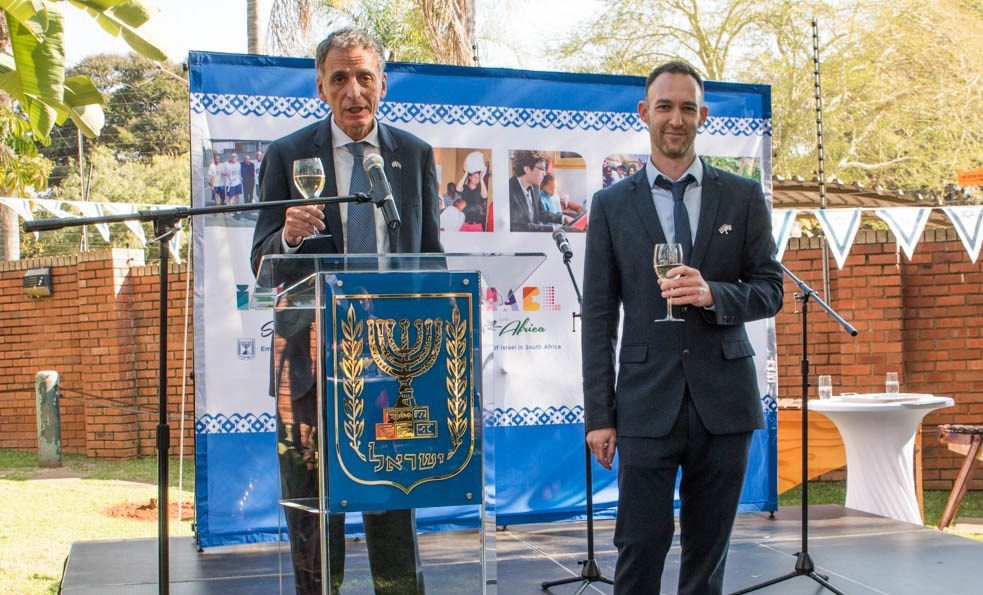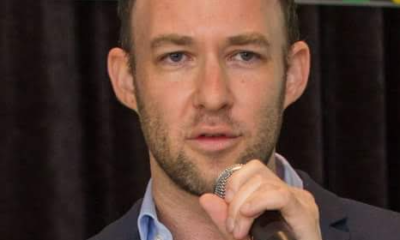
Israel

Celebrating Israel, its achievements, and what it has to offer SA
“The history of the Jewish people can be summarised in four words: ‘We are still here’,” Rowan Polovin, the chairperson of the South African Zionist Federation (SAZF), told hundreds of people gathered to celebrate Israel’s Independence at the Israeli Embassy last Thursday, 9 June.
Ambassadors, international and local dignitaries, communal leaders, and guests applauded loudly and chuckled at this in the embassy garden, knowing that this achievement has been no mean feat. And, Israel’s has been the greatest contributor to it over the past 74 years. Hence, the celebration was hosted by the embassy and the SAZF.
“Please G-d, may the Palestinians and their leadership come to terms with the fact that Israel is here to stay, that she’s going nowhere, and that the only solution for a prosperous future is to coexist peacefully with her,” said Polovin.
“South Africa has an opportunity to play a mediatory role, and in order to do so, needs to stop its hateful anti-Israel rhetoric and recognise that it doesn’t need to be anti-Israel in order to be pro-Palestinian.”
The Israeli ambassador to South Africa, Eli Belotsercovsky, reiterated the importance of reaching an agreement with the Palestinians, which he referred to as “our [Israel’s] greatest challenge of all”.
“We’re neighbours, and we’re bound to live side by side with each other,” he told the guests. “Both of us have to compromise in order to let our people prosper.
“The Israeli people are thirsty for peace, there’s tremendous support for a compromise that will lead us to true reconciliation. However, unfortunately, we have yet to find a partner on the other side.”
Belotsercovsky was, however, excited by Israel’s investment in its relationships in Africa. “Today, we have diplomatic relations with 44 out of 46 sub-Saharan African states. In February, Israel confirmed its status as an observer at the African Union. Only last week, another African leader visited Israel – the foreign affairs minister of the Republic of Togo.”
Polovin traced the Jewish people’s history, and how it intercepted with Israel. “For almost 2 000 years, the Jewish people were scattered around the world after the destruction of the Second Temple in 70 CE and the loss of sovereignty of eretz Yisrael. Each and every day over those 2 000 long years, across lands, cultures, and peoples, the Jews never forgot Zion and Jerusalem.”
And then, 74 years ago, Israel was reborn, and is “the very embodiment of our tenacity as a people”, he said.
“We celebrate the rebirth of Israel, the Jewish homeland, alongside the astounding fact that she continues not only to exist, but to thrive. We are blessed that here in democratic South Africa, we have the freedom to be Jewish, to be proudly South African with our political capital right here in Pretoria, and to be able to celebrate openly that our spiritual, religious, and eternal capital is Jerusalem.”
Polovin pointed out that Israel had become one of the most successful economies in the world, creating more start-ups in the technological and medical arena per capita than any other country, and surpassing South Africa in gross domestic product even though she was 60 times smaller.
“In a new record, Israeli tech companies have raised more than R88 billion in the first quarter of this year alone,” Polovin said.
“Israel, remarkably, is among the happiest nations on earth, according to the world happiness index, and Israelis have a far longer life expectancy than most countries – more than 82 years on average – and the highest birth rate in the developed world.”
He went on to point out that Israel had the most efficient desalination programme in the world, which had enabled it to overcome the crippling water shortages and assist other nations. “And, after 30 years of shrinkage, the sea of Galilee is finally overflowing its banks. Israel has enormous energy and water solutions to offer South Africa. It’s high time that South Africa opened up to these opportunities.”
“Israel has achieved all this in spite of 14 wars, countries bent on its destruction, antisemitic boycott movements, countless hostile United Nations resolutions, and a growing trend of worldwide antisemitism which has been further exacerbated by the coronavirus crisis.”
Polovin said that in the past two years, the Arab-Israeli conflict had effectively ended, with Israel normalising relations with the United Arab Emirates, Bahrain, Sudan, and Morocco.
“A few weeks ago, the foreign ministers of Egypt, Morocco, United Arab Emirates, Bahrain, United States, and Israel travelled to the Negev desert in southern Israel to create a forum to further the historic Abraham Accords, which has led to a warm peace between Israel and the Arab world. This metamorphosis within the Arab world, after decades of hostility towards Israel, opened new possibilities and opportunities unimagined until recently, and South Africa has an opportunity to be part of this transformation.”
The ambassador said that while Israel was a dynamic country, “we didn’t have it easy, and time and time again, had to face attempts to destroy our state. To prevail, we had to pay a terrible price in the lives of our young people, who sacrificed themselves for the defence of our country. Tragically, we’re continuing to pay this price today.”
He said that as a Jewish State, Israel was proud of the participation of the country’s minorities in the political, economic, social, and cultural life of the country.
“Currently, an Arab Islamic Party is a member of the ruling coalition, and we have two Arab ministers. This in addition to MPs, judges, mayors, ambassadors, academics, lawyers, doctors, entrepreneurs, and many others. Last but not least, our national football team consists of a high number of Muslim players, including the captain.”
He reiterated that Israel was a world leader in agriculture, water management, cyber technology, the automotive industry, and boasted eight Nobel Prize laureates in the sciences.
Israel has so far trained more than 60 000 African experts in Israel and in different African countries, Belotsercovsky said. “Israel has undertaken different projects in the field of healthcare, agriculture, and social development in all of sub-Saharan Africa.
“In Limpopo, the Israeli non-government organisation, Innovation Africa, has connected close to half a million people to running water. The embassy has worked with NGOs to create vegetable gardens at schools and provide food for students. We have also trained young women to deal with GBV [gender-based violence]. And yet, this is only a small part of what we can do together.”











Paula Seligman
July 21, 2022 at 3:56 pm
Israel & Tikkun Olam go hand in hand.
Am Yisrael Chai.
Shabbat Shalom
Paula